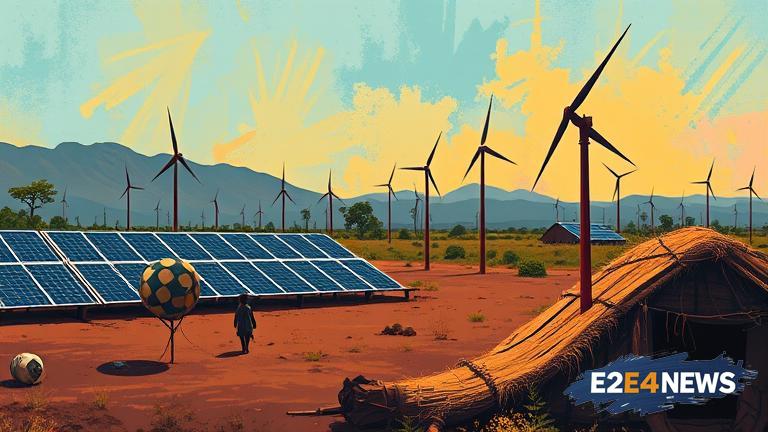Africa has been witnessing a significant surge in the adoption of renewable energy sources, particularly solar and wind power, in recent years. This shift is driven by the continent’s abundant natural resources, declining technology costs, and increasing awareness about the importance of mitigating climate change. As a result, many African countries are now investing heavily in renewable energy infrastructure, creating new opportunities for economic growth and job creation. The African Union’s ambitious target of generating at least 300 gigawatts of renewable energy by 2030 is a testament to the continent’s commitment to a sustainable energy future. In South Africa, for example, the government has launched several initiatives to promote the development of renewable energy, including the Renewable Energy Independent Power Producer Procurement (REIPPP) program. This program has already led to the creation of thousands of jobs and the generation of over 3,000 megawatts of clean energy. Similarly, in Morocco, the government has set a target of generating 52% of its electricity from renewable sources by 2030, with a focus on solar and wind power. The country’s massive Noor-Ouarzazate solar power plant, which spans over 2,500 acres, is one of the largest in the world and generates enough electricity to power over 1 million homes. In East Africa, countries such as Kenya and Ethiopia are also making significant strides in the development of renewable energy. Kenya’s Lake Turkana Wind Power project, for example, is one of the largest wind farms in Africa and generates over 300 megawatts of clean energy. Ethiopia’s Grand Ethiopian Renaissance Dam, on the other hand, is set to become one of the largest hydroelectric power plants in Africa, with a capacity of over 6,000 megawatts. The adoption of renewable energy in Africa is not only driving economic growth but also helping to reduce carbon emissions and mitigate the impacts of climate change. According to the International Renewable Energy Agency (IRENA), Africa’s renewable energy sector could support up to 24 million jobs by 2030, while also reducing carbon emissions by up to 310 megatons. Furthermore, the use of renewable energy can also help to improve energy access in Africa, where over 600 million people still lack access to electricity. In rural areas, for example, mini-grids and off-grid solar systems can provide reliable and affordable energy to communities that are not connected to the national grid. The development of renewable energy in Africa is also attracting significant investment from international organizations and private companies. The African Development Bank, for example, has committed to investing $25 billion in renewable energy projects in Africa by 2025. Similarly, companies such as Google and Microsoft are also investing heavily in renewable energy projects in Africa, recognizing the continent’s vast potential for clean energy generation. Despite the many benefits of renewable energy, however, there are still several challenges that need to be addressed. These include the high upfront costs of renewable energy technologies, the lack of infrastructure and transmission lines, and the need for greater policy and regulatory support. To overcome these challenges, African governments and international organizations will need to work together to create an enabling environment for the development of renewable energy. This can involve providing incentives for investment, improving infrastructure and transmission lines, and developing policies and regulations that support the growth of the renewable energy sector. In conclusion, Africa’s renewable energy revolution is gaining momentum, driven by the continent’s abundant natural resources, declining technology costs, and increasing awareness about the importance of mitigating climate change. As the continent continues to invest in renewable energy infrastructure, it is likely that we will see significant economic growth, job creation, and reductions in carbon emissions. With the right policies and investments in place, Africa can become a global leader in the transition to a low-carbon economy, while also improving energy access and reducing poverty.
